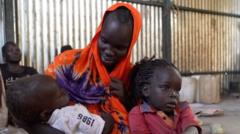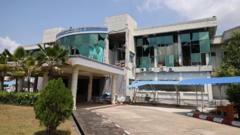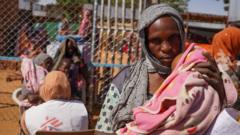In a dramatic turn in Sudan's civil war, the Rapid Support Forces (R.S.F.) have declared the establishment of a rival government. This move has elicited a range of reactions, highlighting the complex dynamics of Sudan's ongoing humanitarian crisis.
### Paramilitary Forces in Sudan Announce Parallel Government Amidst Ongoing Civil Conflict

### Paramilitary Forces in Sudan Announce Parallel Government Amidst Ongoing Civil Conflict
Sudan's Rapid Support Forces claim to facilitate peace while facing international scrutiny for alleged atrocities.
Amidst escalating violence and a dire famine that has claimed countless lives, the R.S.F. signed a political charter with its allies in Nairobi, Kenya. They have promised that this agreement aims to steer Sudan towards an end to nearly two years of brutal conflict. Critics point out, however, that this maneuver reflects an alarming bid for power by a group accused of genocide by the United States.
The charter has attracted the participation of various stakeholders, including members of the Sudan People's Liberation Movement-North (S.P.L.M.-N.), indicating a shift in alliances. The immediate aftermath of these developments has seen intensified diplomatic tensions between Sudan’s military-led government and Kenya. The Sudanese authorities characterized Kenya's hosting of R.S.F. leaders as a "disgraceful" act, prompting the withdrawal of their ambassador from Nairobi.
Countries backing the R.S.F. assert they are engaging in peace-building efforts, while critics believe these negotiations could deepen divisions within Sudan. Various Kenyans and human rights advocates have condemned the Kenyan government’s facilitation of these talks, perceiving it as complicity in the ongoing atrocities experienced by the Sudanese population.
As the situation continues to unfold, the international community watches closely, weighing the implications of this bold move by the Rapid Support Forces in the context of Sudan’s deteriorating humanitarian landscape.
The charter has attracted the participation of various stakeholders, including members of the Sudan People's Liberation Movement-North (S.P.L.M.-N.), indicating a shift in alliances. The immediate aftermath of these developments has seen intensified diplomatic tensions between Sudan’s military-led government and Kenya. The Sudanese authorities characterized Kenya's hosting of R.S.F. leaders as a "disgraceful" act, prompting the withdrawal of their ambassador from Nairobi.
Countries backing the R.S.F. assert they are engaging in peace-building efforts, while critics believe these negotiations could deepen divisions within Sudan. Various Kenyans and human rights advocates have condemned the Kenyan government’s facilitation of these talks, perceiving it as complicity in the ongoing atrocities experienced by the Sudanese population.
As the situation continues to unfold, the international community watches closely, weighing the implications of this bold move by the Rapid Support Forces in the context of Sudan’s deteriorating humanitarian landscape.



















